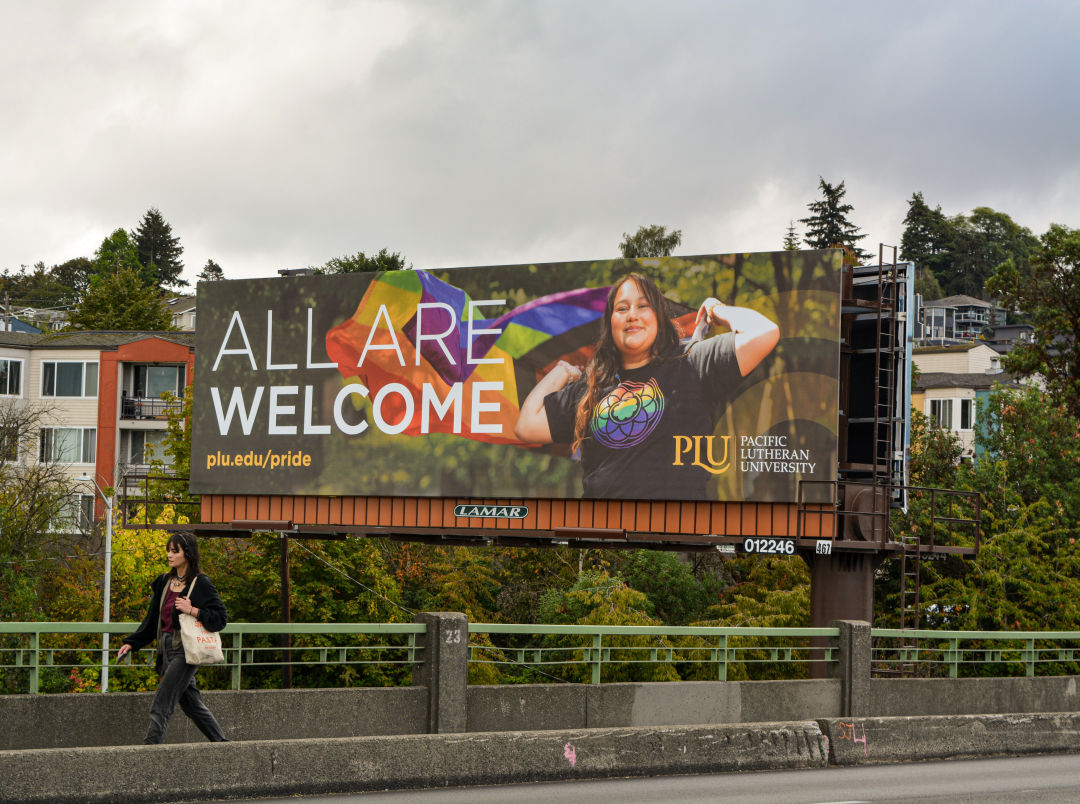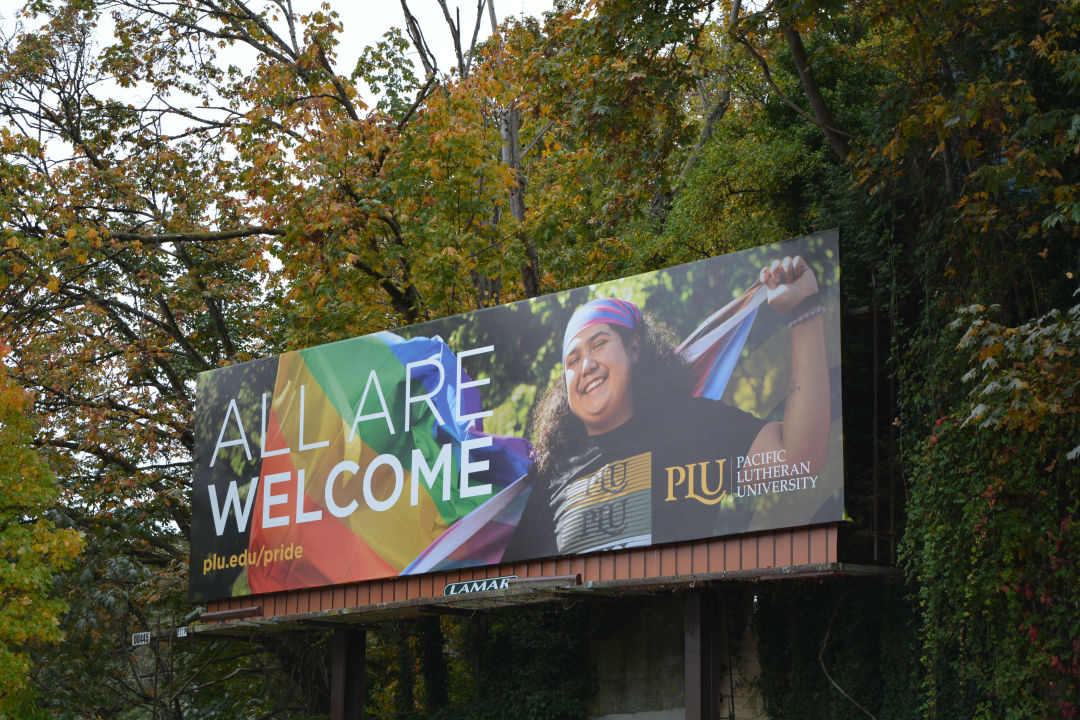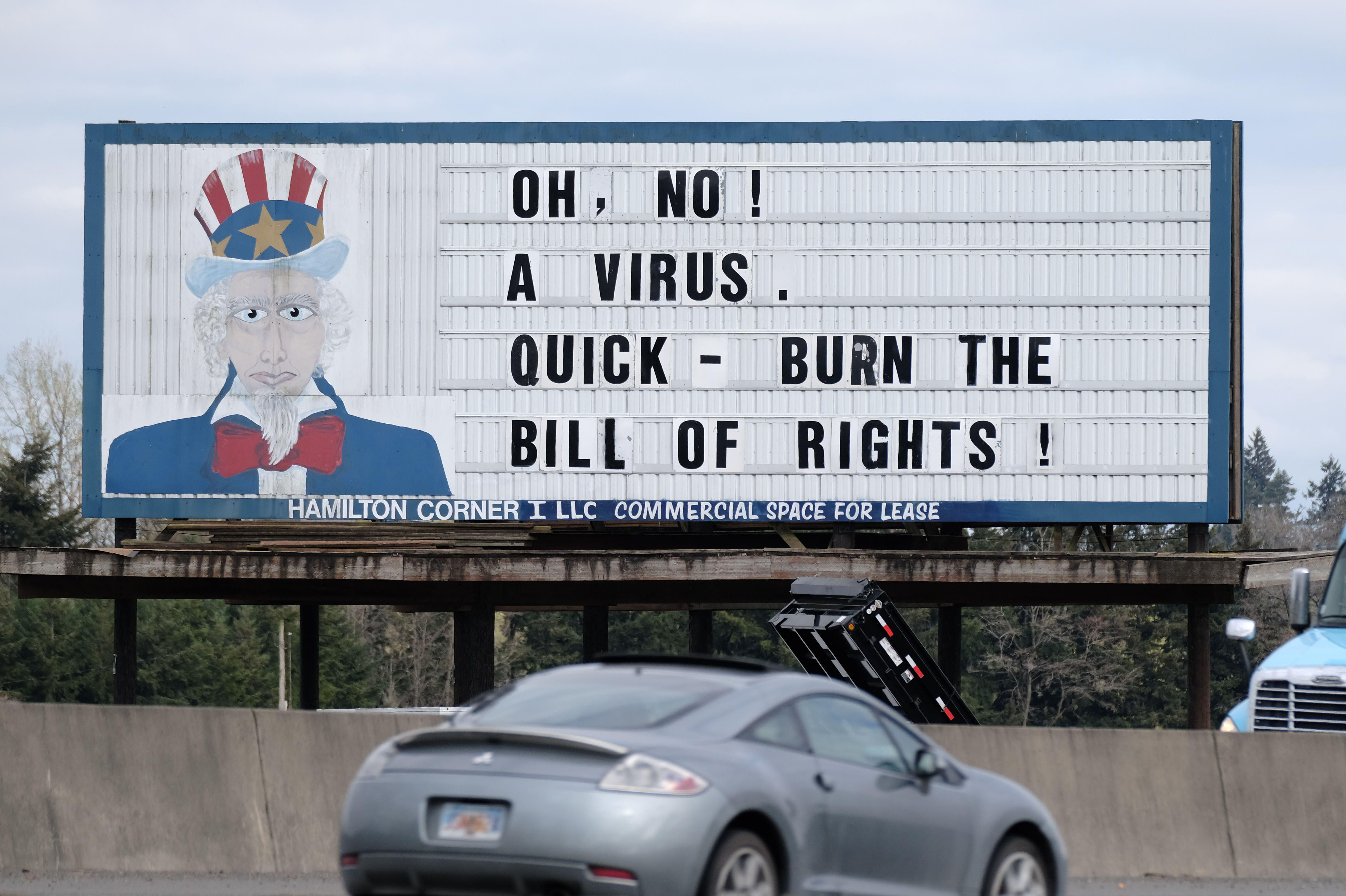Inside the Battle Between Two Private Christian Colleges for LGBTQ+ Students

Image: Adam Willems
At the southwestern end of the Fremont Bridge—nestled into Queen Anne’s steep northern slope where Lake Union flows into the Ship Canal—there’s a new, if somewhat ephemeral, sight to behold: a rainbow-colored billboard from Pacific Lutheran University.
The billboard popped up in September and shows a smiling student sporting a multicolored university T-shirt; they’re holding a pride flag over their shoulders, which billows before a woodsy background. “ALL ARE WELCOME,” the billboard exclaims, inviting passersby to learn more about the Tacoma-based university through its website.
Those who notice it—despite the frenzy of the Fremont Bridge’s southern intersection and the brazen norm to drive through it at 40mph—might think this oversize Pride poster is nothing more than an analog overture to local high schoolers during admissions season. But it’s actually part of a targeted campaign, which began last fall and has since intermittently straddled each east-west extreme of North Queen Anne. That’s an hour’s drive from PLU’s campus. But right next door to another one.
Seattle Pacific University is a local, private, Christian institution of higher learning much like PLU—save for its explicit policies against employing openly LGBTQ+-identifying faculty and staff, a highly controversial (and legally contentious) practice the school’s board reaffirmed in 2022 to “remain in communion with its founding [Free Methodist] denomination.”
A prepared statement for Seattle Met from PLU president Allan Belton suggests the billboards’ location is intentional and a multipronged ploy: an admissions strategy, sure, but also a theological dissent, a pedagogical intervention, and a form of queer-affirming activism.
“PLU launched this campaign because we believe faith-based institutions of higher education should take the lead in welcoming everyone,” Belton says. “By placing billboards in North Queen Anne, we are proud to invite all people of goodwill to join us as students, faculty, staff, and community partners… And if the billboards encourage other institutions and individuals to become more welcoming, they will have been well worth the investment.”

Image: Adam Willems
Private colleges and universities across the United States have weathered a steady admissions crisis as well as downstream budgetary challenges since the Great Recession. Declining birth rates, changing immigration policies, and a shifting economic landscape all contributed to a 15 percent decline in postsecondary enrollment between 2010 and 2021.
These larger trends have affected PLU and SPU to differing degrees. Pacific Lutheran has 2,600 enrolled students, down from 3,018 in 2014. Anticipating further demographic declines, the school has fixed four-year tuition costs, expanded financial aid, and established automatic acceptance frameworks with 40 regional school districts. The school has also used billboards to advertise its fixed tuition guarantee and promote other campus values. Its enrollment has stabilized since 2020.
In 2014, Seattle Pacific University’s undergraduate community numbered around 3,200 students; by 2023 that figure was barely above 2,100. In a prepared statement, Seattle Pacific University told Seattle Met that the school “welcomed one of the most diverse classes in our history when 500 new students arrived this month, including more than 45 percent of students being the first in their family to attend a college or university.”
Enrollment figures are up, but do not suggest a rebound from precipitous declines in enrollment that students, alumni, and admissions staff explicitly tie to the school’s anti-LGBTQ+ hiring policies. SPU’s highest leadership position focused on diversity and inclusion has also remained vacant for two years; the university’s first and only administrator in that role, Dr. Sandra Mayo, resigned in May 2022 after SPU’s board reaffirmed its hiring policies.
“The goal right now for SPU’s administration is to sort of buckle down and commit to the bit,” says Carrie Cox, who previously served as the treasurer of Haven, SPU’s official club for LGBTQ+ students and allies. Cox also led the school’s student government as its president, and participated in SPU’s presidential search committee; she graduated from SPU in June 2024 and now studies applied physics as a Master’s student at Stony Brook University in New York.
Following the SPU board’s reaffirmation of its anti-LGBTQ+ hiring policies in May 2022, the chair of the board, six other trustees, and the university’s president resigned or did not renew their terms. SPU has also sued Washington Attorney General Bob Ferguson for investigating SPU’s employment practices; settled a lawsuit brought against it by nursing professor Jeaux Rinedahl, who had sued the university in 2021 for discrimination, alleging he was denied a full-time faculty position due to his sexual orientation; and settled another lawsuit by 16 students, faculty and staff, who accused SPU leadership of breaching fiduciary duty. In June 2023, facing a budget deficit and declining enrollment, SPU officials announced a 40 percent budget reduction for academic programs as well as major layoffs.
Cox says she saw the school’s board and administration grow more ideologically homogeneous once dissenting SPU leaders resigned; Cox also says she sensed “a lot of paranoia” from the school’s administration, who suspect faculty of “being in cahoots [with] students” against them, which “is creating a really toxic environment” at the university. (SPU faculty members contacted by Seattle Met declined to be interviewed.)
The university’s administration has also dictated how Haven is allowed to celebrate queer students and identity on campus. Cox helped organize SPU’s first official Pride-focused festival in May. Originally titled PrideFest, the event had to be renamed, administrators told student organizers, because it could confuse Seattleites, as Seattle’s official Pride festival has the same name, albeit downtown and in late June. Cox and co-organizers were also told they were not allowed to bring drag artist Aleksa Manila to perform at the festival. In a meeting with other student organizers, Cox suggested renaming the event [Redacted]Fest as a way to “laugh about” administrative censorship. The name stuck.
Hundreds of students attended [Redacted]Fest to mingle with over 30 off-campus queer resource groups, snack on food from queer-owned businesses like Frelard Tamales and Dough Joy doughnuts, and occupy the school gym while a 30-foot Pride flag hung on stage—where Cox and a co-organizer performed in drag themselves. “I view [Redacted]Fest as…probably the most important thing I ever did on campus, including being a student,” Cox says.
SPU declined to comment on PLU’s billboard or explain whether bringing drag artist Aleksa Manila to [Redacted]Fest would have violated the school’s employment policies.
“Buckling down on [its anti-LGBTQ+ policies] is just inflaming things more and making it all worse and keeping [SPU] in the news, like in this article,” Cox says. “You drive into campus and you see Christian gay pride messaging on [PLU’s] billboards, which personally made me laugh every time I’d see them. But they were also a stark reminder… ‘Oh, they can do it. They can be religious and inclusive. Why can’t we?’”
Whether intentionally or not, PLU’s “Christian gay pride messaging” makes the school the latest Christian institution to use Seattle’s built environment to advance a theological argument. As Jessica Johnson, an independent scholar who chronicled the decline of pastor Mark Driscoll's Mars Hill Church, told Seattle Met, other local Christian institutions have used local infrastructure to capture the attention of passersby.
From curious billboards to public baptisms in stadiums and parks, these analog strategies are effective because of their random diffusion: They’re not pre-targeting their audiences the way a social media ad would, exposing a wider public to ideas they’d quickly scroll past if they encountered it on their screen. Otherwise uncurious viewers may begin to change their views on an institution—or even a religion—in the process.




